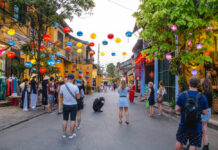Embarking on a journey abroad often opens doors to new experiences, cultures, and friendships. Among these adventures, discovering romantic connections can add an exciting dimension to your travels.If you are a lonely person and looking for a date with someone you met during your trip, then www.evivatour.com is please give you tips to help you impress that person.
The Fundamentals of Dating During Travel
Understanding the core principles that underpin safe, respectful, and enjoyable dating experiences abroad is vital. When you’re in unfamiliar territory, cultural norms, personal boundaries, and emotional readiness become even more significant. Setting a solid foundation ensures that your interactions are positive, consensual, and enriching for all involved.
Understanding Cultural Norms and Taboos
Traveling introduces you to diverse societies, each with its unique customs related to dating and relationships. What might be acceptable behavior in one country could be taboo in another. For instance, public displays of affection may be commonplace in some Western nations but frowned upon elsewhere.
It’s essential to do some research before arriving at your destination. Reading about local customs, observing how locals interact, and consulting travel guides or forums can provide crucial insights. Recognizing differences helps avoid misunderstandings and unintentional offenses. For example, in certain Middle Eastern countries, modest dressing and conservative behavior are expected, and overt romantic gestures could attract unwanted attention or legal scrutiny.
Moreover, understanding dating norms includes recognizing gender roles, expectations regarding commitment, and societal attitudes towards LGBTQ+ relationships. Respecting these norms isn’t just about avoiding trouble; it reflects genuine appreciation for local culture. When in doubt, erring on the side of caution and showing respect fosters trust and openness.
Lastly, being sensitive to religious beliefs and traditions that influence social interactions is vital. During Ramadan, for example, public displays of affection or alcohol consumption may be inappropriate or prohibited. Adaptability and cultural humility go hand-in-hand with responsible dating.
The Importance of Respect and Consent
Respect and consent stand as the pillars of any healthy relationship, especially in unfamiliar environments. When traveling, it’s easy to get carried away by excitement or curiosity, but maintaining clear boundaries remains paramount.
Prioritize open communication from the outset. Make sure both parties feel comfortable expressing their feelings and limits. Consent should always be enthusiastic and ongoing; never assume agreement based on prior interactions or body language. Respect someone’s decision if they indicate discomfort, even if it means pausing or ending further engagement.
Be mindful of power dynamics that may exist due to differences in age, nationality, or socio-economic status. Power imbalances can sometimes lead to exploitation or coercion, which must be vigilantly avoided. Respect extends beyond physical boundaries—consider emotional boundaries, privacy, and personal space.
In addition, practicing cultural sensitivity involves respecting local customs around dating and intimacy. What might be acceptable for you back home could be offensive elsewhere. Approaching every interaction with kindness, patience, and a willingness to learn helps foster meaningful and respectful connections.
Preparing Mentally and Emotionally for Casual or Serious Connections
Traveling naturally evokes excitement, but it also triggers emotional vulnerability. Preparing mentally and emotionally for different types of romantic encounters ensures a balanced experience.
First, define what you’re seeking. Are you open to casual flings, or are you looking for something more serious? Clarifying your intentions helps prevent misunderstandings and aligns expectations early on. Be honest with yourself about your emotional readiness to engage in romantic pursuits abroad, where the stakes might feel higher given unfamiliar surroundings.
Traveling can evoke feelings of loneliness or desire for companionship, which might lead to impulsive decisions. Developing emotional resilience enables you to handle potential disappointments gracefully, whether a connection doesn’t develop as hoped or ends unexpectedly. Remember that not every encounter needs to evolve into a long-term relationship.
It’s also essential to maintain self-awareness and manage expectations. Cultural differences, language barriers, or personal insecurities can influence interactions, so approach each encounter with patience and an open mind. Investing time in self-care, reflection, and setting boundaries will help you enjoy the romantic aspects of your trip without compromising your well-being.
Finally, consider potential emotional risks and have strategies to cope with them. Building a support system—whether through friends, family, or local contacts—can offer reassurance and guidance during your journey.
Planning Your Travel and Dating Timeline
Strategic planning enhances your chances of meaningful romantic encounters while ensuring you enjoy your travel experience. Balancing sightseeing, cultural exploration, and social engagement creates a fulfilling itinerary that accommodates your dating ambitions.
Choosing Destinations Favorable for Meeting New People
Not all destinations are equally conducive to meeting like-minded travelers or locals interested in dating. Urban centers, popular tourist hubs, and culturally vibrant cities tend to offer more opportunities for social interactions.
Cities with lively nightlife, bustling markets, and numerous events invite spontaneous meetings. For instance, places known for festivals, social gatherings, or active expatriate communities can significantly enhance your chances of connecting with others. Research destinations that align with your interests—whether adventure, arts, cuisine, or history—and identify hotspots for social interaction.
Furthermore, consider destinations with a reputation for being open-minded and welcoming toward foreigners. Places that celebrate diversity or have an active LGBTQ+ scene can provide more inclusive environments for various relationship preferences.
Remote or secluded destinations might offer fewer opportunities for casual dating but can still be perfect for meaningful, intimate experiences with locals who value genuine connection over superficial encounters. Think about your comfort level and priorities when selecting locations that match your social goals.
Timing Your Trip to Maximize Opportunities
Timing plays a critical role in maximizing your chances of meeting potential partners. Peak seasons often coincide with festivals, holidays, or major events, attracting larger crowds and increasing social opportunities.
Plan your trip around local festivals, cultural celebrations, or international conferences aligned with your interests. These occasions provide natural settings for meeting people and engaging in shared activities. Additionally, consider traveling during shoulder seasons—periods just before or after peak tourism times—when places are less crowded but social scenes remain lively.
Longer stays afford better opportunities to develop meaningful connections rather than fleeting encounters. If you’re aiming for a serious relationship, investing extra time in a destination allows for deeper bonding and understanding.
Balance your sightseeing plans with dedicated social activities. Avoid packing your schedule too tightly—leave room for spontaneous meetups and relaxed conversations. Flexibility enables you to adapt to unexpected opportunities and create authentic experiences.
Balancing Sightseeing with Social Engagements
While exploring iconic landmarks and immersing yourself in local culture are essential parts of travel, dedicating time for social engagements enriches your overall experience. Striking this balance requires intentional planning.
Allocate specific days or afternoons for social activities such as group tours, cooking classes, dance lessons, or local clubs. These settings facilitate organic interactions with fellow travelers and locals alike. Joining organized events reduces the anxiety of approaching strangers and provides common ground for conversation.
On the other hand, prioritize visits to community spaces, cafes, or parks where locals gather. Sitting in lively venues or participating in informal gatherings often leads to spontaneous conversations. Being approachable, maintaining open body language, and showing genuine curiosity about your surroundings makes you more inviting.
Remember that genuine connections often blossom when you’re relaxed and present in the moment. Don’t view sightseeing and socializing as mutually exclusive tasks but as complementary parts of your holistic travel experience.
Safe and Responsible Dating Practices Abroad
When pursuing romantic connections during travel, prioritizing safety and responsibility protects your wellbeing and preserves respect for your partner and local community. Being vigilant and following best practices mitigates risks and promotes positive experiences.
Protecting Personal Information and Privacy
Sharing personal details with new acquaintances can be tempting, especially when chemistry develops quickly. However, safeguarding your privacy is crucial in unfamiliar environments where scams or malicious intents may lurk.
Avoid revealing sensitive information such as your home address, financial details, or travel plans prematurely. Use secure communication channels and consider using pseudonyms until trust is established. Be cautious about sharing photos or videos that could be exploited or used against you.
If you’re communicating online, verify your partner’s identity through video calls or social media profiles linked to real identities. Recognize red flags such as inconsistent stories, requests for money, or evasiveness—these signals often indicate scam attempts.
Use reputable dating apps or platforms that prioritize user security and moderation. Enable privacy settings, and report suspicious activity promptly. Remember, protecting your digital footprint is a vital component of responsible dating abroad.
Recognizing and Avoiding Potential Scams
Travel destinations are sometimes hotspots for scammers targeting unsuspecting tourists for financial gain or malicious purposes. Recognizing common scams can save you from unnecessary trouble.
Common scams include fake romantic interests who solicit money under false pretenses, or individuals who manipulate emotions to extract valuables. Be wary of overly eager suitors or those insisting on quick involvement when they barely know you.
Scammers may also create elaborate schemes involving counterfeit documents, fake emergency situations, or staged accidents requiring assistance. Always verify claims and avoid giving money or sensitive information unless you’re absolutely certain of the person’s legitimacy.
Stay alert to your surroundings—be cautious when invited to private locations or when asked to leave secured areas. Trust your instincts; if something feels off, disengage respectfully and seek help if needed.
Setting Boundaries and Communicating Clearly
Healthy dating relationships hinge on clear boundaries and effective communication. When abroad, these elements become even more important due to cultural differences and potential misunderstandings.
Express your boundaries early, whether regarding physical intimacy, alcohol consumption, or personal space. Be explicit about your comfort levels and listen attentively to your partner’s perspectives.
Communicate openly about expectations, intentions, and any concerns. Clarify what type of relationship you’re seeking—whether casual or committed—to ensure mutual understanding. Respect your partner’s boundaries and be receptive to feedback.
Establishing boundaries also includes discussing safety measures, such as choosing safe meeting spots, informing trusted friends about your whereabouts, and agreeing on signals or check-in times. Open dialogue fosters trust and minimizes misunderstandings.
Strategies for Meeting Like-Minded Travelers
Connecting with like-minded travelers or locals interested in dating requires proactive and genuine efforts. Leveraging the right tools and activities increases your chances of forming authentic bonds during your trip.
Utilizing Travel Apps and Dating Platforms
Technology simplifies the process of finding romantic interests abroad. Numerous dating apps cater specifically to travelers or offer filters to match your preferences.
Create a compelling profile that honestly reflects your personality and intentions. Use recent photos and mention your interests to attract compatible matches. Engage actively by initiating conversations and being respectful in your approach.
Some apps allow location-based searches, making it easier to connect with nearby users. Others focus on specific communities, such as LGBTQ+ dating platforms, ensuring inclusivity and safety.
Beyond dating apps, travel-specific social platforms like Couchsurfing or Meetup can help you find social events, gatherings, or local hosts willing to introduce you to the community. These avenues often yield more genuine and less transactional connections.
Engaging in Group Activities and Tours
Joining group activities is an excellent way to meet like-minded strangers in a relaxed setting. Participating in group hikes, cooking classes, dance workshops, or wine tastings creates shared experiences that naturally foster conversations.
Tour operators often organize themed excursions catering to particular interests—art lovers, adventure seekers, or cultural enthusiasts. Opting for these activities not only enriches your travel experience but also connects you with potential romantic interests who share your passions.
Additionally, volunteering opportunities or community service projects allow meaningful interactions rooted in common values. Such engagements often lead to deeper connections than superficial encounters.
Participating in Local Events and Social Gatherings
Attending local festivals, concerts, or social events immerses you in the culture and creates organic opportunities for interaction. Keep an eye on community boards, social media groups, or hotel notices for upcoming events.
Clubs, language exchanges, and expat meetups are particularly welcoming to travelers seeking to socialize. These settings typically attract open-minded individuals eager to share stories and forge new friendships.
Approach these gatherings with curiosity, humility, and an open heart. Authentic engagement often results in memorable experiences and potential romantic sparks.
Cultural Sensitivity and Etiquette in Dating
Being aware of and respecting local cultural practices enhances your experience and demonstrates genuine interest and respect for the community you visit. Awareness of etiquette nuances prevents misunderstandings and fosters positive connections.
Understanding Local Dating Customs and Traditions
Every society has its unique dating customs, from courtship rituals to expectations around gender roles. Learning these customs shows respect and can serve as a bridge to building rapport.
For example, in some Asian cultures, family approval is essential before formal commitments. In contrast, Western societies may emphasize individual choice. Recognizing these differences informs your approach and prevents inadvertently offending your partner or their family.
Research customary gift-giving, dress codes, or public interaction norms. In certain countries, giving flowers or small gifts might hold significant meaning, while in others, it might be unnecessary or inappropriate.
Understanding traditional rituals or ceremonies related to dating, such as engagement customs or matchmaking practices, enriches your cultural comprehension and your interactions.
Appropriate Communication Styles
Effective communication varies across cultures—what’s considered assertive in one setting might be rude in another. Pay attention to tone, gestures, and conversational topics.
In some cultures, indirect communication or subtle hints are preferred over direct expressions. Being too blunt might offend or cause confusion. Conversely, overly reserved communication could be misinterpreted as disinterest.
Observe local conversational styles—whether they lean towards formality or casual interactions—and adapt accordingly. Showing genuine interest by asking thoughtful questions about local customs or opinions endears you to your partner.
Non-verbal cues such as eye contact, body language, and physical distance hold significance. Educate yourself on these cues to interpret interactions correctly and respond appropriately.
Gift-Giving and Other Cultural Gestures
Gifts are often an integral part of cultural etiquette, symbolizing respect and affection. When considering gift-giving, research what’s appropriate within the local context to avoid missteps.
In some societies, modest tokens like souvenirs or local delicacies suffice. In others, elaborate gifts may be customary during special occasions. Be mindful of potential implications—excessive generosity may be misunderstood or create uncomfortable obligations.
Other gestures, such as bowing, handshake protocols, or specific attire, also convey respect. Adhering to these cultural norms demonstrates sensitivity and fosters positive impressions.
Always approach cultural gestures with humility, and when unsure, observe local behaviors or discreetly ask trusted sources for guidance.
Overcoming Language Barriers
Language differences pose challenges but can also be gateways to deeper connection if approached with effort and creativity. Employing practical strategies helps mitigate misunderstandings and builds rapport.
Learning Basic Local Phrases
Learning key phrases like greetings, thank you, please, and basic questions about directions or accommodations showcases your respect and willingness to engage. Simple greetings like “Hello,” “Good morning,” or “How are you?” break the ice and can initiate conversation.
Practice pronunciation and memorize essential expressions pertinent to social interactions. Even a sincere attempt to speak the local language demonstrates effort and appreciation, often eliciting friendly responses.
Carry a phrasebook or use language learning apps to expand your vocabulary and practice regularly. It boosts your confidence and smooths initial interactions.
Using Translation Apps Effectively
Translation technology is invaluable in bridging language gaps. Apps like Google Translate enable real-time conversation, text translation, and even image-based translations for menus or signs.
Familiarize yourself with these tools before your trip. Download offline dictionaries in case of limited internet access. When conversing, speak slowly and clearly, allowing the app to process accurately.
While translation apps are helpful, avoid relying solely on them for deep conversations. They are supplementary tools that, combined with non-verbal cues and patience, enhance effective communication.
Non-Verbal Communication Tips
Body language, facial expressions, and gestures transcend language barriers. Maintaining open posture, smiling genuinely, and exhibiting attentive listening foster positive interactions.
Mirroring your partner’s body language subtly can build rapport, signaling comfort and interest. Use gestures to emphasize points or to express friendliness, but be aware of cultural differences in their interpretations.
Eye contact, when culturally appropriate, conveys sincerity. In some cultures, prolonged eye contact indicates confidence; in others, it may be considered intrusive.
Being attentive to non-verbal signals helps you gauge comfort levels and adjust your approach accordingly.
Navigating Long-Distance and Digital Relationships
As travel often involves periods of separation, managing virtual connections becomes crucial for sustaining romantic interests developed abroad.
Maintaining Connections Across Borders
Utilize technology to keep relationships vibrant despite geographical distances. Regular messaging, sharing photos, and video calls sustain emotional bonds and foster intimacy.
Schedule calls considering time zone differences to show respect and consistency. Sending thoughtful messages or virtual souvenirs maintains engagement and demonstrates genuine care.
Expressing your feelings openly and honestly reinforces trust. Sharing your daily experiences and listening intently to your partner’s updates deepen the connection.
Using social media thoughtfully allows you to share moments and build shared narratives, enhancing your bond even when apart.
Managing Expectations and Future Plans
Discussing future intentions and expectations early prevents misunderstandings. Clarify whether your relationship is casual or leading to something more permanent, and respect each other’s desires.
Setting achievable goals, such as visiting each other or planning trips together, keeps the relationship goal-oriented. Discuss potential challenges, such as visa requirements or cultural differences, and strategize solutions collaboratively.
Being transparent about emotional needs and limitations fosters mutual understanding and helps both partners navigate uncertainties.
When to Transition from Online to In-Person Meetings
Deciding when to meet face-to-face hinges on trust, comfort, and logistical considerations. Prioritize safety and ensure both parties are genuinely interested and prepared.
Choose neutral, public venues for initial meetings. Share your plans with trusted friends or family, including details of your whereabouts and expected duration.
Once comfortable, plan logistics carefully—consider travel arrangements, accommodation, and health precautions. Proceed gradually, allowing the relationship to develop naturally.
In-person meetings can validate online chemistry and lay the groundwork for deeper connections. Approach these moments with patience and mindfulness.
Handling Rejection and Disappointments Gracefully
Not every romantic pursuit will succeed, and handling rejection maturely contributes to your growth and future success.
Staying Respectful and Positive
Accept rejection graciously, understanding cultural or personal differences may influence the outcome. Respond politely, thank the person for their honesty, and refrain from negative comments.
Maintaining a positive attitude fosters dignity and leaves room for future interactions. Remember that rejection isn’t a reflection of your worth but often a result of incompatible circumstances or differences.
Expressing gratitude for the experience transforms disappointment into a learning opportunity. Cultivating resilience helps you stay optimistic and open to new possibilities.
Learning from Unsuccessful Encounters
Reflect on what worked and what didn’t. Consider cultural misunderstandings, communication issues, or mismatched expectations that influenced the outcome.
Use these insights to improve your approach, adapt your behavior, and refine your understanding of cross-cultural dating dynamics.
Viewing failures as stepping stones rather than setbacks encourages personal growth. Each experience teaches valuable lessons about yourself and others.
Moving Forward After a Breakup or Disappointment
Give yourself time to process emotions. Engage in self-care activities, seek support from friends or mentors, and avoid dwelling on negatives.
Focus on your travel goals and the joys of discovering new places and cultures. Stay open-minded and remember that every experience, positive or negative, enriches your journey.
A graceful recovery sets the stage for future opportunities, helping you build confidence and resilience in navigating the complex landscape of dating while traveling.
Safety Tips for Solo Female Travelers
Women traveling alone must be especially vigilant to ensure safety while exploring romantic connections. Taking proactive steps can make your journey secure and enjoyable.
Identifying Safe Meeting Locations
Choose public, well-lit areas for meetings—cafes, hotels lobbies, busy parks, or popular restaurants. Avoid secluded or private spaces initially, especially during late hours.
Inform trusted friends or family members of your plans, including the location, time, and contact details. Share your live location via smartphone apps if possible.
Trust your instincts; if something feels wrong, don’t hesitate to end the meeting and seek help. Listening to your gut is fundamental to personal safety.
Trusting Your Instincts
Your intuition often detects danger or discomfort before your conscious mind does. Honoring these feelings is critical.
If your partner exhibits controlling behavior, makes inappropriate comments, or pressures you into uncomfortable situations, respectfully but firmly set boundaries or remove yourself from the situation.
During interactions, pay attention to verbal cues and body language. If you notice inconsistency or evasiveness, proceed with caution.
Sharing Your Plans with Trusted Contacts
Keep close friends or family informed about your whereabouts. Share your itinerary, contact information, and any changes promptly.
Consider setting up regular check-ins during your trip, especially after outings or dates. Having someone aware of your plans adds an extra layer of security.
Utilize safety apps that allow quick alerts or emergency calls. Carry a whistle or personal alarm for added security.
Legal Considerations and Local Laws
Abiding by local laws and regulations safeguards you from legal complications and demonstrates respect for the host country’s sovereignty.
Understanding Public Behavior Regulations
Many countries have strict rules regarding public conduct, especially concerning public displays of affection, alcohol consumption, or dress codes.
Research these regulations beforehand to avoid unintended offenses. For example, in certain countries, kissing or holding hands in public may be illegal or frowned upon.
Respect local sensitivities and opt for discreet, culturally appropriate behavior, even if it differs from your norms at home.
Navigating Dating Laws and Age Restrictions
Ensure that your romantic interests comply with local age of consent laws. Engaging with minors or violating age restrictions can result in severe legal repercussions.
Be aware of laws surrounding cohabitation, marriage, or partnerships, which may vary widely across jurisdictions.
When in doubt, seek advice from official resources or legal experts to stay compliant and avoid jeopardizing your safety.
Dealing with Legal Issues or Conflicts
In case of misunderstandings or disputes, seek assistance from local authorities or your embassy. Knowing your rights and available resources provides peace of mind.
Having copies of your identification, travel documents, and contact information for your embassy is advisable.
Remaining calm, cooperative, and respectful during conflicts facilitates resolution and minimizes escalation.
Creating Memorable Experiences Without Compromising Values
Travel is about embracing authenticity, respecting personal boundaries, and making meaningful memories that last a lifetime.
Embracing Authentic Connections
Seek genuine interactions rooted in mutual respect and shared interests. Focus on building rapport rather than solely pursuing romantic outcomes.
Explore local traditions, participate in cultural exchanges, and listen actively. These moments often lead to authentic bonds and profound insights into the community.
Authenticity fosters trust and lays the groundwork for lasting relationships, whether romantic or platonic.
Respecting Personal Boundaries
Honor your own limits and communicate them clearly. Respect others’ boundaries, cultural norms, and comfort levels.
Avoid pressure tactics or rushing intimacy—allow relationships to evolve naturally and comfortably for both parties.
Balancing openness with discernment ensures your experience remains positive and aligned with your values.
Making the Most of Your Travel Romance
Cherish the moments you share, regardless of how long they last. Every encounter enriches your personal story and broadens your worldview.
Create lasting memories through shared adventures, heartfelt conversations, and genuine kindness. Celebrate the uniqueness of each connection while remaining true to yourself.
Travel romances can be transformative, offering lessons in love, culture, and self-awareness that resonate long after your trip ends.
Practical Tips for Successful Dating While Traveling
Implementing practical strategies maximizes your enjoyment and safety in the realm of travel romance.
Managing Time and Budget Constraints
Plan your itinerary to include social activities without sacrificing sightseeing. Allocate specific funds for dates, outings, or gifts to avoid overspending.
Prioritize quality over quantity—meaningful interactions often matter more than numerous superficial ones. Be strategic in choosing the best opportunities for connection.
Maintain flexibility to accommodate spontaneous dates or events. Unexpected encounters can be the most memorable.
Staying Safe During Nightlife Activities
Nightlife venues can be lively and fun but also pose safety risks. Stick to reputable clubs or bars frequented by locals and tourists alike.
Travel with trusted friends or inform someone about your plans. Limit alcohol intake to stay alert and in control.
Arrange transportation in advance, such as taxis or ride-sharing services, and avoid accepting rides from strangers.
Being Open Yet Discerning
Approach new connections with an open heart but maintain a healthy skepticism. Balance curiosity with caution, especially when trust is still developing.
Listen to your instincts, observe behavior, and take your time building rapport. Patience often leads to more meaningful and safe experiences.
Remember that genuine chemistry develops over time—don’t rush or force situations.
Post-Travel Reflection and Lessons Learned
After your trip, reflecting on your experiences helps internalize lessons and prepares you for future adventures.
Evaluating Your Experiences
Assess what worked well—such as cultural understanding, communication skills, or safety measures—and identify areas for improvement.
Consider the types of connections that resonated most and how you felt during different interactions. This self-awareness informs your approach for subsequent journeys.
Journaling or discussing your experiences with friends can deepen your insights and promote personal growth.
Integrating Travel Dating Lessons into Future Trips
Apply your newfound knowledge to refine your travel planning, cultural understanding, and safety protocols.
Develop a personalized toolkit of communication strategies, safety measures, and cultural sensitivities. Continuously update based on past experiences.
Embrace spontaneity while maintaining responsibility—your future travel endeavors will benefit from your enhanced awareness.
Building Lasting Relationships or Moving On Gracefully
Decide whether to nurture meaningful connections or to let go respectfully. If maintaining long-distance relationships, establish clear expectations and communicate regularly.
Should a relationship not work out, honor the experience, learn from it, and move forward with positivity. Every encounter contributes to your evolving understanding of love, culture, and yourself.
Celebrating both successes and setbacks cultivates resilience and enriches your journey in dating while traveling.
Conclusion
Navigating romantic encounters during travel is a multifaceted adventure that combines cultural sensitivity, personal integrity, and open-hearted exploration. By understanding local norms, practicing respect and consent, and employing responsible safety practices, you can cultivate meaningful and memorable connections across borders. Strategic planning, cultural awareness, and effective communication pave the way for fulfilling experiences—whether casual or long-term—that enhance your journey and broaden your perspective on love and life itself. Embrace the adventure of travel romance with confidence and curiosity, knowing that each encounter holds the potential to transform your understanding of relationships and yourself.
























